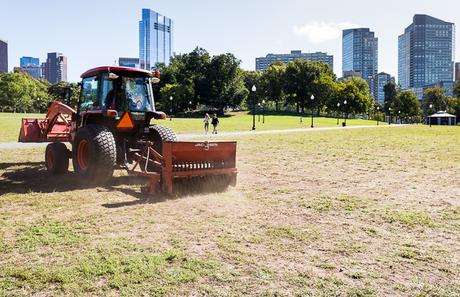In 2017, the Friends continues to care for the lawns in the Boston Common, Public Garden, and Commonwealth Avenue Mall, and we've expanded that care in a big way. This year marked the first time the Friends has managed all seventeen irrigation systems in the three parks.
Our primary goal managing the irrigation is to maintain peak efficiency for the systems, reduce water use, and increase the overall health of the lawns and trees. Some lawn areas were getting too much water while others were not getting enough, and we do not want to be watering the lawns when it is raining! We have replaced antiquated equipment, made major improvements to two of the nine systems on the Mall, and responded to every Bos:311 citizen report or concern regarding water loss typically within 24 hours. We were able to trial a more sophisticated irrigation controller that will collect data on water use and soil moisture levels. This new controller would allow the Garden to be managed with a high degree of efficiency so that individual sections could be on different watering schedules based on the needs of that lawn, shrub border or flower bed. The current system is based on larger zoned sections managed through a very basic timer, we are excited learning more about the new system.

We continue our seasonal turf treatments, providing the parks with a comprehensive turf program. These seasonal treatments are basic landscape practices of aerating, seeding, fertilizing, and additional soil amendments to increase the vigor of our lawn panels. Areas treated included all lawns on the Common, and on the Mall every block from Arlington Street to Kenmore Square. Areas not treated were the Charlesgate East block until there is resolution of the non-permitted off-leash dogs, and the area on the Common fenced off due to the Parks Department Capital Improvement Projects. We have expanded our fertilization program to help weather related stress in the warm months and have begun to address problem areas on the Common for mowers and tractor operations by filling in uneven terrain and eroded. We continue to work with Parks Department on best practices around mowing. When the grass is mowed higher, it doesn't dry out as fast, is better able to withstand the pressures of foot traffic, reduces weeds, and the lawns are healthier overall.
There is so much more to do in terms of turf and soils care. This will be a multi-year effort to address all the pressing needs. Each park presents its own challenges and use patterns but we are slowly but surely making gains in the quality of turf, amount of turf coverage, and for those areas irrigated, less water borne disease issues.
